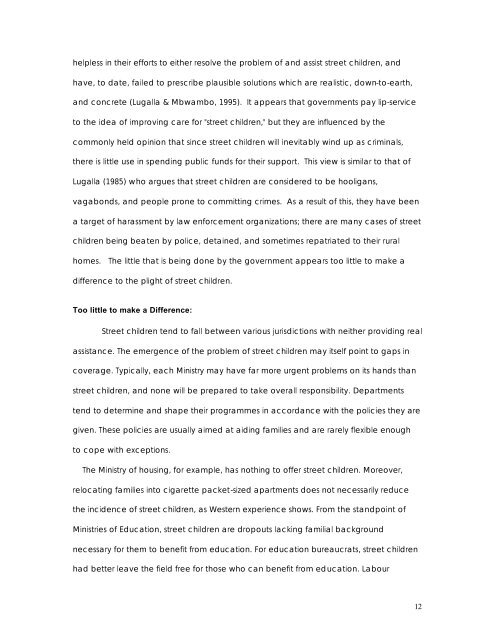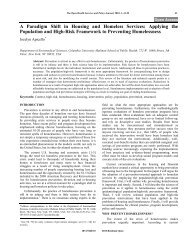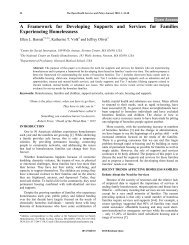international conference on street children and street children's
international conference on street children and street children's
international conference on street children and street children's
Create successful ePaper yourself
Turn your PDF publications into a flip-book with our unique Google optimized e-Paper software.
helpless in their efforts to either resolve the problem of <strong>and</strong> assist <strong>street</strong> <strong>children</strong>, <strong>and</strong><br />
have, to date, failed to prescribe plausible soluti<strong>on</strong>s which are realistic, down-to-earth,<br />
<strong>and</strong> c<strong>on</strong>crete (Lugalla & Mbwambo, 1995). It appears that governments pay lip-service<br />
to the idea of improving care for "<strong>street</strong> <strong>children</strong>," but they are influenced by the<br />
comm<strong>on</strong>ly held opini<strong>on</strong> that since <strong>street</strong> <strong>children</strong> will inevitably wind up as criminals,<br />
there is little use in spending public funds for their support. This view is similar to that of<br />
Lugalla (1985) who argues that <strong>street</strong> <strong>children</strong> are c<strong>on</strong>sidered to be hooligans,<br />
vagab<strong>on</strong>ds, <strong>and</strong> people pr<strong>on</strong>e to committing crimes. As a result of this, they have been<br />
a target of harassment by law enforcement organizati<strong>on</strong>s; there are many cases of <strong>street</strong><br />
<strong>children</strong> being beaten by police, detained, <strong>and</strong> sometimes repatriated to their rural<br />
homes. The little that is being d<strong>on</strong>e by the government appears too little to make a<br />
difference to the plight of <strong>street</strong> <strong>children</strong>.<br />
Too little to make a Difference:<br />
Street <strong>children</strong> tend to fall between various jurisdicti<strong>on</strong>s with neither providing real<br />
assistance. The emergence of the problem of <strong>street</strong> <strong>children</strong> may itself point to gaps in<br />
coverage. Typically, each Ministry may have far more urgent problems <strong>on</strong> its h<strong>and</strong>s than<br />
<strong>street</strong> <strong>children</strong>, <strong>and</strong> n<strong>on</strong>e will be prepared to take overall resp<strong>on</strong>sibility. Departments<br />
tend to determine <strong>and</strong> shape their programmes in accordance with the policies they are<br />
given. These policies are usually aimed at aiding families <strong>and</strong> are rarely flexible enough<br />
to cope with excepti<strong>on</strong>s.<br />
The Ministry of housing, for example, has nothing to offer <strong>street</strong> <strong>children</strong>. Moreover,<br />
relocating families into cigarette packet-sized apartments does not necessarily reduce<br />
the incidence of <strong>street</strong> <strong>children</strong>, as Western experience shows. From the st<strong>and</strong>point of<br />
Ministries of Educati<strong>on</strong>, <strong>street</strong> <strong>children</strong> are dropouts lacking familial background<br />
necessary for them to benefit from educati<strong>on</strong>. For educati<strong>on</strong> bureaucrats, <strong>street</strong> <strong>children</strong><br />
had better leave the field free for those who can benefit from educati<strong>on</strong>. Labour<br />
12
















